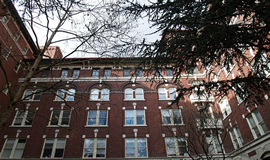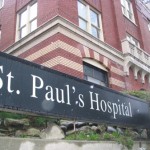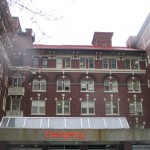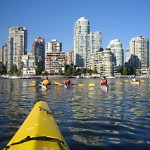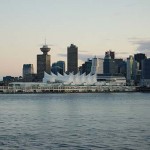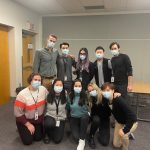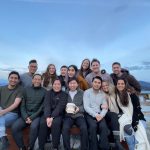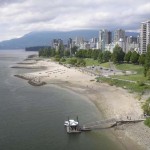Site Director Message
Welcome to the St. Paul’s Site of the UBC Family Practice Residency Program! Our Site is situated on the traditional, ancestral and unceded territories of the Coast Salish peoples, including the Səl̓ílwətaʔ/Selilwitulh (Tsleil-Waututh), the xʷməθkwəy̓əm (Musqueam), and the Skwxwú7mesh (Squamish) Nations. We acknowledge with gratitude their wisdom and stewardship of these lands, and for opportunities to work together in a good way towards healing, learning and reconciliation.
If you have a strong commitment to social justice and advocacy, along with excellent self-directed learning skills this may be the perfect site for you!
We offer learning experiences in Inner City Medicine, Addiction Medicine, LGBTQ2S Health, HIV/AIDS, Primary Care Maternity, Indigenous Health, and Care of the Elderly, along with longstanding and well evaluated rotations in Emergency Medicine, Internal Medicine and Palliative Care, plus our own Family Practice Teaching Service. We focus on the development of strong clinical skills and independent judgment through experiential learning, with excellent Family Medicine and specialty support in both community-based and hospital settings.
Our first year consists of block rotations as well as longitudinal academic and Family Medicine time to help you to build comprehensive clinical skills and to start to experience continuity of care with your preceptor’s patients. Our unique “longitudinal” second year allows you to use your organizational skills to choose and coordinate your electives, “selectives” and enhanced rural opportunities in order to meet your particular clinical, academic, and career interests. In second year, you will be able to divide your time much like a full-service family physician might: covering your home practice 2-3 days a week and balancing that with electives, shifts in the ER, hospital or nursing home visits, attending births, and taking call with your community preceptor. This provides you with a self-directed, flexible and unique opportunity to focus your training to build the core and enhanced skills you need to fulfill your career goals.
The faculty and community-based preceptors at our site are known for their collegiality, diversity and excellence in teaching and research. We meet regularly as a group with resident representatives to ensure that the concerns of residents are addressed promptly and openly. Collectively, we have a diverse range of interests and academic achievements that are woven into the academic program at our site. These include Addiction Medicine, Behavioural Medicine, Indigenous Health, End-of-Life Care, Maternity Care, LGBTQ2S Health, Inner City Medicine, Health Advocacy, Social Justice, Medical Education and Primary Care Research. We value respectful relationships and resident wellness. We work hard to establish and nurture effective teamwork and self-awareness.
Our graduates are now working in a wide variety of practices from urban inner city to rural remote settings across the country. A number of our alumni have also gone on to develop successful research, academic and medical education careers, and many have returned to St. Paul’s as preceptors, mentors and leaders.
Our Site Coordinator Kitty Dich and Program Assistant Maria Totsikas are key administrative members of the welcoming community of individuals that make up our training site team. We are very excited about your interest in our training site and hope to answer any questions you might have at our virtual open house and information sessions!
St. Paul’s CMG Co-Site Directors:
Dr. Betty Calam, MD, CCFP, MClSc, FCFP
bcalam@providencehealth.bc.ca
Todd Sakakibara, MD, CCFP, FCFP, (AM)
Todd.Sakakibara@vch.ca
Lead Resident Message
Thank you for your interest in the St. Paul’s Hospital (SPH) CMG Program! Located in Vancouver on the unceded traditional territories of the xʷməθkwəy̓əm (Musqueam), Sḵwx̱wú7mesh (Squamish), and Səl̓ílwətaʔ (Tsleil-Waututh), our site takes pride in training Family Physicians who provide full-service primary care, develop expertise in more focused areas in Family Medicine, and participate in research and medical education.
Serving people who experience systemic oppression in Vancouver’s downtown core, SPH attracts members of the healthcare community who believe advocacy is fundamental to the practice of medicine. As such, our preceptors tend to be strong advocates for social justice. Residents from our site experience the full breadth and depth of Family Medicine, and also have unique opportunities to develop enhanced competencies in areas including: Inner City Medicine, Addictions Medicine, HIV Primary Care, LGBTQ2S+ Health, and Indigenous Health. We benefit from the academic success of SPH as well as world-leading affiliated groups such as the BC Centre for Substance Use and BC Centre for Excellence in HIV/AIDS.
SPH Family Medicine residents complete the majority of our training at SPH and consequently develop close relationships with various specialists and multidisciplinary health care providers. It is not uncommon for attending physicians in the Emergency Department or consulting physicians to know you on a first-name basis and pull you into valuable bedside teaching. With this connection, there is a strong emphasis in all rotations on providing learning opportunities that are relevant to and grounded in Family Medicine; you are not just an “off-service” resident here. Although it is a tertiary care facility, SPH feels remarkably community-based.
Our program is a tight-knit community, and we take resident wellness seriously. Our Program and Site Directors strongly believe that how we are treated as residents directly translates into how we will treat our patients, colleagues, and future learners. We are also privileged to be backed by a wonderful team of administrative staff who go above and beyond their roles to support us throughout our years of training. Site Faculty are eager to engage us in shaping our curriculum and highly value our feedback and recommendations.
In addition to a supportive faculty, our program itself is intentionally designed to promote both structured and self-directed learning. R1 begins with Foundations of Family Medicine, an entire month dedicated to covering high yield topics, while allowing time for residents to integrate into their home clinic. There are no on-call responsibilities during this month, so you can get to know your colleagues, settle into Vancouver, and take advantage of the beautiful patio and beach weather.
At the start of residency, you are paired with a community Family Medicine preceptor who provides mentorship throughout the duration of the residency program. In R1, residents spend a half-day per week with their preceptor at their home Family Medicine clinic following academic teaching, and approximately 3-5 half-days per week in R2. Our preceptors are chosen because they are Family Physicians who are excited to teach and are skilled coaches who ease the transition from being a new resident to an independent practitioner and lifelong learner.
Learning in Family Medicine is rounded out by a variety of mandatory rotations which address core areas of medicine, and residents at SPH benefit from training at other high-yield sites such as BC Women’s and Children’s Hospital. After a year of core rotations, R2 provides the flexibility – by way of its mostly longitudinal format – for residents to tailor their clinical experiences to support personal interests, strengthen specific areas to become a well-rounded Family Physician, and prepare for the CCFP examination. Our residents have completed out-of-province and international rotations, and there is ample elective time to explore other areas such as research, medical education, and leadership.
Needless to say, Vancouver is a beautiful place to live and offers a fantastic balance of city adventures and outdoor activities. In addition to the weekly academic half-days and program retreats, residents take advantage of what living here has to offer, are keen to celebrate birthdays, holidays, and call-protected Wednesday evenings! Whether you have family here or are moving here as a new beginning, Vancouver does not disappoint.
Current residents in the program are incredibly excited to meet you! Residency is challenging no matter where you are, but we are all incredibly happy with our experience and we don’t think we can imagine ourselves training anywhere else. CaRMS applicants are always welcome to get in contact with us via email, as listed below. We look forward to seeing you during the CaRMS Open House.
Dr. Karkirat Singh & Dr. Connor Weyell
Number of Residents: 13 CMG
Location: Vancouver, BC
Community: 600,000 – 2 million
Hospitals: St. Paul’s, BC Women’s and Children, Mount Saint Joseph’s
Curriculum Type: R1 Block / R2 Longitudinal
R2 Elective Time: 12 Weeks
Phone: 604-806-8569
Contacts: Site Co–Director – Dr. Betty Calam & Site Co-Director Dr. Todd Sakakibara / Coordinator – Kitty Dich
Lead Resident: Dr. Karkirat Singh & Dr. Connor Weyell
Overview
The St. Paul’s Site is connected to a dedicated group of Family Practice preceptors who serve the urban core and inner city. St. Paul’s Hospital is a tertiary referral hospital located in downtown Vancouver that maintains strong ties with the community. The site trains primary care physicians with a broad range of interests including full-service Family Practice, Palliative Care, HIV/AIDS, Addictions, LGBTQ2S+ and Indigenous Health. It is affiliated with Vancouver Coastal Health Authority and all residents spend at least one month at Three Bridges Community Health Centre, an inner-city primary care clinic. St. Paul’s is also home to the BC Centre for Excellence in HIV/AIDS and is a provincial quaternary referral center for Cardiology and Cardiothoracic Surgery related illness. There is a leading-edge Palliative Care Service through which all of our residents rotate, as well as highly regarded departments of Family and Community Medicine, Internal Medicine, and Emergency Medicine.
Program Highlights
- Home of one of only two active Family Practice teaching wards in Canada, modeling comprehensive and continuous care in a metropolitan setting
- Family Practice training is carried out in community practices and residents are matched for two years with a community Family Practice preceptor and will spend at least eight months with them
- Majority of primary care inpatient and specialist training takes place at St. Paul’s Hospital, a tertiary referral hospital of 480 beds including Internal Medicine, Obstetrics, and a very busy Emergency department
- St. Paul’s has been a teaching hospital for residents and interns for over 70 years and has a proud reputation for the quality of its teaching programs
- Opportunity to spend time in inner-city community clinics orientated to serving the inner city core, including HIV, Addiction Medicine, and Indigenous Health
Sample Rotation
|
Block 1 |
Block 2 |
Block 3 |
Block 4 |
Block 5 |
Block 6 |
Block 7 |
Block 8 |
Block 9 |
Block 10 |
Block 11 |
Block 12 |
Block 13 |
|
|
PGY1 |
Intro |
FPTS |
3 Bridges |
FM |
Elec/ Vac |
Peds/ Elec |
Peds |
EM |
Elec/ Vac |
OB/ Elec |
iMat |
Surg/ Pall |
IM |
|
PGY2 |
Psyc |
FPTS/ |
Long* |
Long* |
Long* |
Long* |
Long* |
Rural |
Rural |
Gyne/ Elec |
Long* |
Long* |
CofE/ Prac |
*Longitudinal curriculum comprises of 14 weeks of Family Med, 8 weeks of elective and 2 weeks of procedural skills (usually in half days)
Current and Past Resident Perspectives
What do you enjoy most about the St. Paul’s Hospital (SPH) program?
St. Paul’s feels like a community hospital despite its location in a large urban centre. There’s a strong sense of collegiality and you get to know the other doctors and nurses.
St. Paul’s is a unique program that provides enhanced opportunities to develop skills in providing care to marginalized populations, including from the inner city and those who identify as Indigenous or as part of the LGBTQ spectrum, alongside traditional Family Medicine. Our program integrates determinants of health and social justice issues.
Is there a strong focus on doing procedures?
If you’re interested in procedures, St. Paul’s is well set up for resident teaching – staff are eager to give you hands-on practice, even as “off-service” Family Medicine residents. That said, you do have to seek it out a bit if you’re looking to do a lot of drains, intubations or LPs. For many of us, the focus is more on the doctor-patient relationship, providing patient-centered care grounded in awareness of the power of the social determinants of health. The St. Paul’s Hospital Family Medicine Program views advocacy as a central pillar of Family Medicine and believes that being aware of patients’ barriers to health – such as housing, addictions, mental illness, and financial insecurity – promotes effective medical care.
How is the program organized?
R1 is fairly structured and block-based. In R2, you control your own schedule and can tailor it to include what interests you; the schedule is mostly longitudinal with a few blocks. You do approximately 2-3 days/week at your family practice office and then intersperse your longitudinal experiences. You can do short block electives as well; the scheduling is extremely flexible.
The caveat to having this flexibility is that you need to be a self-directed learner – it helps to have strong administration and organization skills. The program is ideal for forward-thinkers who have a strong sense of their strengths and weaknesses and the ability to direct their longitudinal second year to improve their skills.
Is there a large service component to your residency?
We do work hard but there’s a good balance between service and learning in most rotations. Preceptors try to ensure that we see interesting cases so that we’re not always treating the same thing. SPH depends on residents to a certain extent but the staff do not treat us like scut-monkeys. Our role is clearly defined and well-respected by doctors and staff. Post-call rules and days off in lieu are honoured, and we have an amazing Program Director who backs us up.
Is there competition with other residents?
There isn’t an excess number of residents at SPH, even though Royal College residents also work here. There are good opportunities to be exposed to procedures, deliveries, the OR and clinics without being crowded out by other learners. The SPH family practice residents are fun, vivacious, and passionate. It’s common to frequently see your friends in the hallways, the ER, or while you’re up at 3 AM. Most people are enjoyable to work with here – we actually rely heavily on each other. If I need help with something, I know who to call because we’re aware of each other’s schedules.
How is the St. Paul’s program different from that of Greater Vancouver?
Unlike the Greater Vancouver residents, you do most of your training in one hospital. Many of us live within 10 minutes of St. Paul’s so we don’t have a big commute. SPH’s catchment area includes the Downtown Eastside so we have more exposure to addictions, infectious diseases, mental illness, and other marginalized populations.
Do residents only practice at the hospital?
We work mostly at SPH during R1 and for the R2 Psychiatry block. We all work at Three Bridges, an inner city clinic located near SPH, for one month during R1. We do Pediatric Emergency Medicine at BC Children’s Hospital, which complements a rotation in outpatient community Pediatrics. Our Family Practice offices are community-based around the city, ranging from maternity heavy, to Downtown Eastside addictions heavy. We also do a two-month rural rotation in BC. Our longitudinal R2 allows us to practice anywhere – electives are available at every hospital in the Lower Mainland and at a large number of community clinics.
St. Paul’s is an older facility. What kind of services are available there?
It’s older but it has character! The Emergency Department is new and the beds and equipment are modern. Obstetrics is a single-room delivery facility now, which is great. It has everything you’d expect in a tertiary-care hospital with the exception of Pediatrics and a step-down unit. It is the Centre of Excellence in BC for HIV/AIDS and the Heart Centre for BC.
How easy is it to settle into Vancouver?
Vancouver is a gorgeous spot and there’s housing in a lot of central places including Downtown, Kitsilano, or Mount Pleasant but these areas can be expensive. However, the hospital is easily accessible by bike or transit so you don’t need a car. Almost all of the current residents live within 15 minutes and walk/use transit as parking is difficult to find. Since SPH is right on Davie St, it’s close to a lot of good restaurants. In terms of quality of life, it’s very hard to beat Vancouver.
What do you think is the biggest strength of the SPH program?
At St Paul’s we have amazing flexibility to tailor our program to our own interests and gain skills and confidence in areas that will be relevant to our own future practice. We get to do this with amazing back up from our staff and Program Director, and encouragement from preceptors from other services in the hospital who we get to know through our time at SPH. A lot of residents have felt they had time to pick up strong skills in areas of interest such as HIV care, Maternity, Addictions, Transcare, and others.
The other big thing that can’t go without mention is the people. R1s have an intro block for July, with no call so you get to know each other as a cohort and have some time to settle into the city and explore before you truly launch in.
